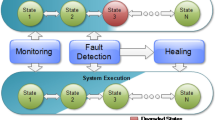Abstract
Mobile agent technology has been proposed for a variety of applications. Fault-tolerance is fundamental to the further development of mobile agent applications. Fault-tolerance prevents a partial or complete loss of the agent. Simple approaches such as checkpointing are prone to blocking, replications scheme is expensive since it has to maintain multiple replicas. In this paper, a new approach rooted from checkpointing is proposed. This scheme can guarantee to detect and recover most failure scenarios in mobile agent systems, even if there occurs machine failure.
Access this chapter
Tax calculation will be finalised at checkout
Purchases are for personal use only
Preview
Unable to display preview. Download preview PDF.
Similar content being viewed by others
References
The Object Management Group: The Mobile Agent System Interoperability Facility, OMG TC Document orbos (2000), http://www.omg.org
Eugene, G., Lubomir, F.B., Michael, B.D.: An Application-Transparent, Platform- Independent Approach to Rollback-Recovery for Mobile-Agent Systems. In: Proc. of 20 th IEEE International Conference on Distributed Computing Systems, Taiwan (2000)
Stefan, P., Andre, S.: FATOMAS- A Fault-Tolerant Mobile Agent System Based on the Agent-Dependent Approach. In: Proc. of the international Conference on Dependable Systems and Networks, pp. 215–224 (2001)
Victor, F.N.: Checkpointing and the Modeling of Program Execution Time. In: Lyu, M.R. (ed.) Software Fault Tolerance, pp. 213–248. John Wiley & Sons, Chichester (1994)
Dag, J., Keith, M., Fred, B.S., Kjetil, J., Dmitrii, Z.: NAP: Practical Fault-Tolerance for Itinerant Computations. In: Proc. of the 19 th IEEE International Conference on Distributed Computing Systems, pp. 180–189 (1999)
Luis, M.S., Vitor, B., Joao, G.S.: Fault-Tolerant Execution of Mobile Agents. In: Proc. of the International conference on Dependable systems and Networks(DSN 2000), pp. 135–143 (2000)
Dag, J., Robbert, R., Fred, B.S.: Operating System Support for Mobile Agents. In: Proc. of the 5 th Workshop on Hot Topics in Operating Systems, Washington, pp. 42–45 (1995)
Philip, A.B., Vassos, H., Nathan, G.: Concurrency Control and Recovery in Database Systems. Addison Wesley, Reading (1987)
Author information
Authors and Affiliations
Editor information
Editors and Affiliations
Rights and permissions
Copyright information
© 2004 Springer-Verlag Berlin Heidelberg
About this paper
Cite this paper
Jin, G., Ahn, B., Lee, K.D. (2004). A Fault-Tolerant Protocol for Mobile Agent. In: Laganá, A., Gavrilova, M.L., Kumar, V., Mun, Y., Tan, C.J.K., Gervasi, O. (eds) Computational Science and Its Applications – ICCSA 2004. ICCSA 2004. Lecture Notes in Computer Science, vol 3045. Springer, Berlin, Heidelberg. https://doi.org/10.1007/978-3-540-24767-8_104
Download citation
DOI: https://doi.org/10.1007/978-3-540-24767-8_104
Publisher Name: Springer, Berlin, Heidelberg
Print ISBN: 978-3-540-22057-2
Online ISBN: 978-3-540-24767-8
eBook Packages: Springer Book Archive




